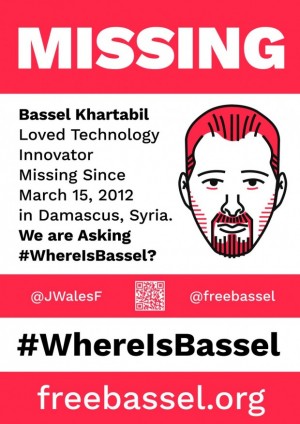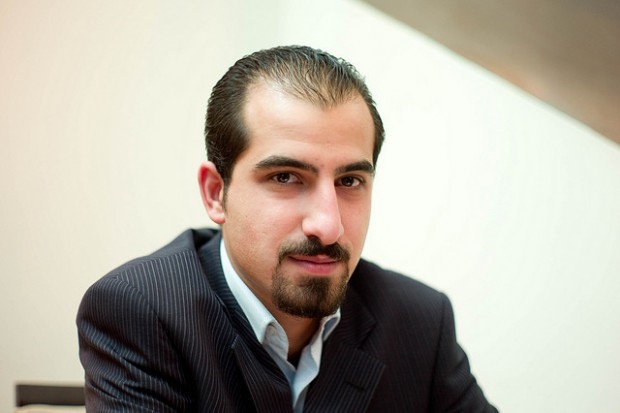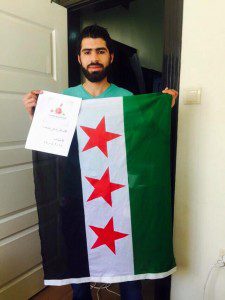Index relies entirely on the support of donors and readers to do its work.
Help us keep amplifying censored voices today.

Join the Jimmy Wales Foundation and other organisations, including Index on Censorship, in a day of solidarity, awareness and support for Palestinian-Syrian open access activist Bassel Khartabil.
Khartabil was detained on 15 March 2012, the first anniversary of the Syrian uprising, as he left work in the al-Mezzeh district of the city. He has been in prison for four years, although his exact location is currently unknown.
Khartabil started Syria’s first hackerspace in 2010 to help advance the open source movement in the country. He is also known for his work with on free culture projects such as Creative Commons, Wikipedia and Mozilla Firefox.
On 12 November 2015, Khartabil’s wife, Noura Ghazi Safadi, reported rumours that her husband had been sentenced to death by the military courts, although the Assad regime has yet to confirm or deny the reports.
On Saturday 19 March people around the world will take to the streets, including at a demonstration at Marble Arch in London, to #FreeBassel. Find the Bassel cutout and take selfies with him and upload it with #WhereIsBassel on social media.
When: 19 March, 2pm
Where: Marble Arch, London (Map)

Four years have passed since Palestinian-Syrian software developer Bassel Khartabil (aka Bassel Safadi) was arrested in Damascus. Following the protests that swept the country in 2011, Syria descended into civil war, leading to a conflict which has now claimed over 250,000 lives. Khartabil was detained on 15 March 2012, the first anniversary of the Syrian uprising, as he left work in the al-Mezzeh district of the city.
The online activist was tortured for five days by the regime of Bashar al-Assad, and was then tried without having access to a lawyer by a military court on charges of “harming state security”. His trial lasted a matter of minutes.
Back in 2010, Khartabil started Syria’s first hackerspace, Aiki Lab, in Damascus. It was a base from which he helped advance the open source movement in Syria. Khartabil is also known for his work on free culture projects such as Creative Commons and Mozilla Firefox, and was an avid contributor and editor to Wikipedia. Prior to his arrest, he was working on software to enable the free flow of information in a country where online communications and networks were closely monitored by the government.
Because of his efforts using technology to promote an open and free internet — especially in Syria, where online censorship is rife and access to knowledge is scant — Khartabil won the 2013 Index on Censorship Digital Freedom Award. In 2012, Foreign Policy magazine named him as one of the top 100 global thinkers.
 Until 3 October 2015, he was being held at Adra Prison in Damascus by the Syrian government. Without prior warning, he was moved to an unknown location, although there is speculation he may have been transferred to the Military Field Court in Qaboun. On 12 November 2015, Khartabil’s wife, Noura Ghazi Safadi, reported rumours that her husband had been sentenced to death by the military courts, although the Assad regime has yet to confirm or deny the reports.
Until 3 October 2015, he was being held at Adra Prison in Damascus by the Syrian government. Without prior warning, he was moved to an unknown location, although there is speculation he may have been transferred to the Military Field Court in Qaboun. On 12 November 2015, Khartabil’s wife, Noura Ghazi Safadi, reported rumours that her husband had been sentenced to death by the military courts, although the Assad regime has yet to confirm or deny the reports.
“I’ve just gotten disturbing and shocking news that Bassel has been sentenced to death. I think this means that the transfer to military prison was very dangerous. I really don’t know other news. May God help him, we hope it’s not too late. We are worried sick about his life,” Ghazi Safadi wrote.
The United Nations Working Group on Arbitrary Detention has deemed Khartabil’s imprisonment as arbitrary and in violation of international law. He has already spent four years unlawfully behind bars with very little contact with the outside world. He was married in prison and has spent four birthdays there.
We encourage you to join Index on Censorship in renewed calls for Khartabil’s immediate release. On Saturday 19 March, a worldwide demonstration in support of Khartabil will take place, including a protest at Marble Arch in London.
In the run-up to the demonstration, Wikipedia founder Jimmy Wales advocated for Khartabil’s freedom. “The current case that I’m really, really campaigning for is the case of Bassel,” he said. “It’s a huge deal; go out and find out about it, but get involved in all of these cases.”
Khartabil’s absence has been felt not only by his family but by the communities he has worked so hard to foster. We must not forget the contributions this champion of free speech has made to digital freedoms.

Ahmed Mohamed al-Mousa
Index on Censorship strongly condemns the murder of Ahmed Mohamed al-Mousa, a member of the news website and campaigning organisation Raqqa is Being Slaughtered Silently (RBSS).
A non-partisan and independent media collective who report on atrocities perpetrated against the civilian population of Raqqa, the group collected an international press freedom award just last month for their work. Al-Mousa was assassinated by a group of unknown masked men on the same day as Index announced his organisation had been long-listed for Index on Censorship’s 2016 Freedom of Expression Awards.
“In their brave pursuit of the truth and their remarkable commitment to the people of Raqqa, RBSS are shining examples to us all. An idea cannot be lost to violence and intimidation and we stand side-by-side with RBSS and its courageous citizen journalists in their refusal to be silenced,” said Index CEO Jodie Ginsberg.
RBSS affiliates are persistently threatened and al-Mousa is the third journalist affiliated with RBSS who has been murdered by Islamic State militants this year.
In October 2015, journalist Ibrahim Abd al-Qader was killed alongside Fares Hamadi in Urfa, southeastern Turkey with a video since surfacing that claims they were murdered to warn all “apostates [that] they will be slaughtered silently”.
A graffiti artist who paints murals in war-torn Yemen, a jailed Bahraini academic and the Ethiopia’s Zone 9 bloggers are among those honoured in this year’s #Index100 list of global free expression heroes.
Selected from public nominations from around the world, the #Index100 highlights champions against censorship and those who fight for free expression against the odds in the fields of arts, journalism, activism and technology and whose work had a marked impact in 2015.
Those on the long list include Chinese human rights lawyer Pu Zhiqiang, Angolan journalist Sedrick de Carvalho, website Raqqa is Being Slaughtered Silently and refugee arts venue Good Chance Calais. The #Index100 includes nominees from 53 countries ranging from Azerbaijan to China to El Salvador and Zambia, and who were selected from around 500 public nominations.
“The individuals and organisations listed in the #Index100 demonstrate courage, creativity and determination in tackling threats to censorship in every corner of globe. They are a testament to the universal value of free expression. Without their efforts in the face of huge obstacles, often under violent harassment, the world would be a darker place,” Index on Censorship CEO Jodie Ginsberg said.
Those in the #Index100 form the long list for the Index on Censorship Freedom of Expression Awards to be presented in April. Now in their 16th year, the awards recognise artists, journalists and campaigners who have had a marked impact in tackling censorship, or in defending free expression, in the past year. Previous winners include Nobel Peace Prize winner Malala Yousafzai, Argentina-born conductor Daniel Barenboim and Syrian cartoonist Ali Ferzat.
A shortlist will be announced in January 2016 and winners then selected by an international panel of judges. This year’s judges include Nobel Prize winning author Wole Soyinka, classical pianist James Rhodes and award-winning journalist María Teresa Ronderos. Other judges include Bahraini human rights activist Nabeel Rajab, tech “queen of startups” Bindi Karia and human rights lawyer Kirsty Brimelow QC.
The winners will be announced on 13 April at a gala ceremony at London’s Unicorn Theatre.
The awards are distinctive in attempting to identify individuals whose work might be little acknowledged outside their own communities. Judges place particular emphasis on the impact that the awards and the Index fellowship can have on winners in enhancing their security, magnifying the impact of their work or increasing their sustainability. Winners become Index on Censorship Freedom of Expression Awards Fellows and are given support for the year after their fellowship on one aspect of their work.
“The award ceremony was aired by all community radios in northern Kenya and reached many people. I am happy because it will give women courage to stand up for their rights,” said 2015’s winner of the Index campaigning award, Amran Abdundi, a women’s rights activist working on the treacherous border between Somalia and Kenya.
Each member of the long list is shown on an interactive map on the Index website where people can find out more about their work. This is the first time Index has published the long list for the awards.
For more information on the #Index100, please contact [email protected] or call 0207 260 2665.